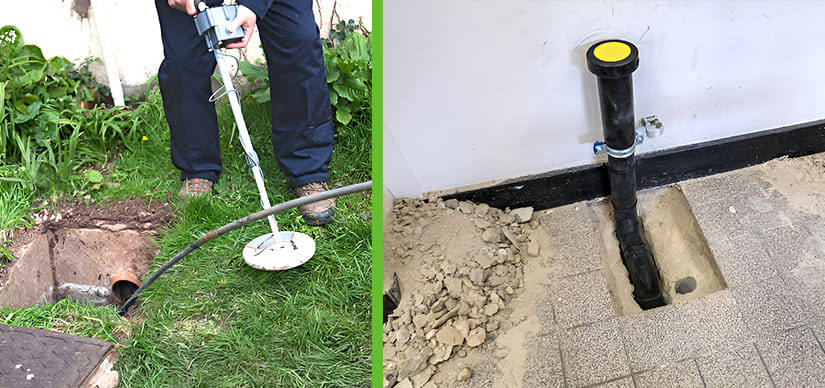Detecting Slab Leaks Early: Save Money on Your Water Bills
Views : 604

Introduction
Are you having a significant rise in your water bill? Well, you likely have a plumbing leak though you haven’t raised your water usage by adding sprinklers to your lawn or filling up a pool. The source of the issue is confusing if you do not observe water seeping through and the floors or walls becoming dark and wet.
Undiscovered water leaks are frequently caused by slab leaks. Subtle pipe breaks that transpire beneath your home’s concrete foundation are known as slab leaks. They have the potential to seriously harm your finances as well as the house. Although they are frequently out of sight, terrible things could happen if they are not found promptly. Thankfully, early detection and slab leak repair in San Diego can prevent structural damage. Let’s look at the signs, causes and fixes of slab leaks
Slab Leaks: What causes them?
Numerous things can lead to a slab leak in San Diego, such as:
Corrosion: Over time, elements in water may lead pipes to corrode and develop leaks.
Pressure: High water pressure can cause cracks or bursts in pipes.
Abrasion: When pipes rub up against concrete and other materials, they may become worn down.
Ground shifting: Pipes may experience pressure from variations in soil conditions brought on by drought or heavy precipitation.
Inadequate Installation: Poor techniques for installation could lead to weak points in the plumbing system.
Tree roots: When tree roots encroach on pipes, damage may result.
Slab Leak Indications
Combating the destruction resulting from a slab leak requires early detection. Watch out for these typical warning signs for slab leak detection in San Diego:
Rising Water Bills: A concealed leak is frequently indicated by an unexpected spike in your water bill.
Hidden Moisture: Damp patches on walls or carpets could indicate subterranean water seepage.
Musty Odors: A persistently foul odor may indicate the growth of mold, which often happens after prolonged contact with water.
Structural Alterations: Although not always suggestive, wall or floor cracks may be connected to foundational problems resulting from underground pipe issues.
Unusual sounds: Even with all faucets turned off, keep an ear out for an unusual noise of running water. This might indicate a leak calling for an expert for slab leak repair in San Diego.
Poor water pressure: A slab leak that is obstructing the flow of water may occasionally be the cause of a drop in water pressure.
How to Stop A Slab Leak in San Diego
Implementing preventive measures can lower the likelihood of slab leak repair in San Diego:
Routine examinations: Plan regular plumbing inspections to find possible problems before they become serious ones.
Insulate Exposed Pipes: You can avoid freezing and possible bursts by shielding your water lines from temperature changes.
Prevent Tree Root growth: Examine and eliminate tree roots that pose a risk to your plumbing system regularly.
Track Water Consumption: Pay careful attention to how much water you use and be on the lookout for any odd spikes.
Improve Your Plumbing: To avoid future problems, if your home has old pipes, think about replacing them with stronger materials.
Slab Leak Detection in San Diego: Advanced Methods
To locate a slab leak precisely, visual inspection and sounding for water sounds might not always be sufficient. More sophisticated methods can be used:
Acoustic Leak Identification: Plumbers can pinpoint the exact location of a leak by enhancing the noise of water running through pipes.
Ground Moisture Identification: Technicians can locate places where water is getting out by using sensors that gauge the amount of moisture in the ground and perform slab leak repair in San Diego.
Infrared thermography: With the use of infrared thermography, floors can be temperature-variably detected, which frequently reveals regions where water is running away
What Happens If You Ignore a Slab Leak
Neglecting a leak from the slab can have disastrous results, such as:
Damage to the structure: The weight of the water can erode the foundation, leading to instability and cracks.
Mold growth: The ideal conditions for mold growth are created by moisture, which puts residents’ health at risk.
High water bills: Water loss that doesn’t stop can lead to extremely high water bills.
Emergency repairs: More costly slab leak repairs in San Diego are frequently the result of waiting till a leak grows into a crisis.
How to Fix a Slab Leak?
Repairing a Small Leak: If the water lines are in good shape and the source of the leak is minor, you can opt for slab leak repair in San Diego by replacing the damaged portion of the pipe. This includes removing the damaged area, excavating the concrete over the leak, and setting up an entirely new pipeline section.
Rerouting: The water supply with new pipes is rerouted when there is significant damage to the pipes or when they are old and rusted. This completely avoids the damaged area.
Pipe Replacement: The best way to prevent future rust-related leaks in homes with outdated galvanized steel pipes is to replace them with copper-based products or plastic pipes.
Final Takeaway
Identifying slab leaks and taking immediate action to protect your house and money is critical. You can take proactive measures to safeguard your property by being aware of the symptoms, causes, and prevention techniques described in this article. Recall that the expenses of neglecting a slab leak are much higher than those of prompt detection and slab leak repair in San Diego. Keep a hidden leak from causing havoc in your house. Slab leak detection is important. Get in touch with a licensed plumber right away.
Don’t disregard any indications of a leaky slab! To find a slab leak repair in San Diego, get in touch with EZ Plumbing right now. Keep both your finances and your house safe.




